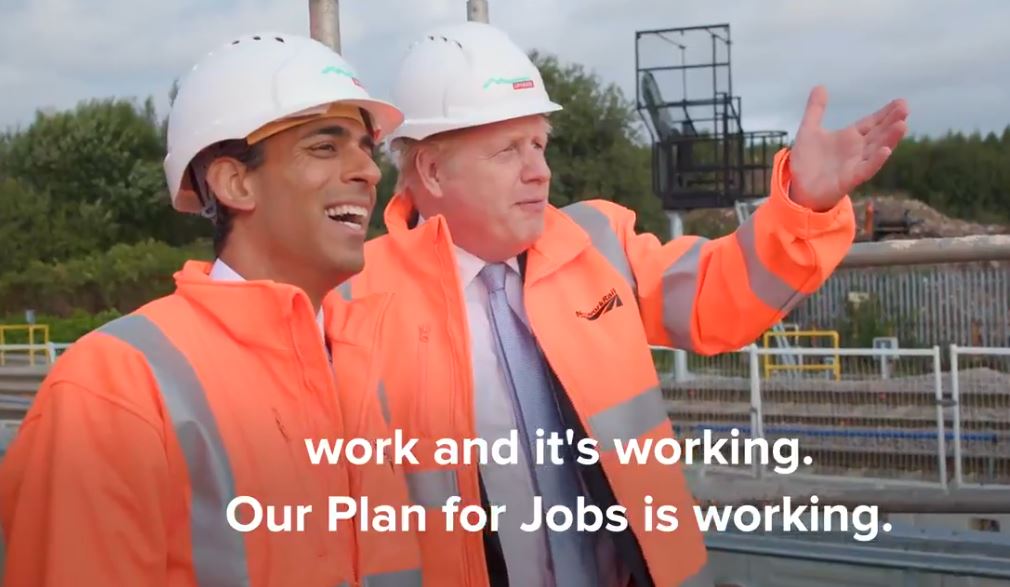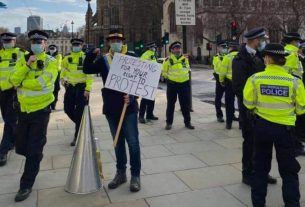Boris Johnson delivers his first conference speech as an election winning prime minister on the very same day his government has chosen to make 5.5 million people poorer by more than £1,000 per year.
Johnson told the BBC yesterday (October 5) that he is not worried about rising costs and supply chain problems because the country is moving to a better economic model – a new approach defined by higher wages and controlled immigration.
Rishi Sunak told conference on Monday that it would be immoral to borrow more money having just spent £407 billion on the pandemic – a number justifying his manifesto-busting tax hike.
The tax hike increases the lower band of national insurance contributions (NICs) and it will – exactly, like the £20 per week cut to universal credit (UC) that comes into effect today (October 6) – make the poorest in society, poorer still.
Maintaining the £20 UC uplift for 5.5 million people will cost an estimated £6 billion per year – less than one-sixth of what’s been spent on ‘track-and-trace’ for England, by Baroness Dido Harding; and less than a third of £350-million-times-52, as seen on the side of the bus.
Brexit dividend
The cut will devastate the millions of people around the UK for whom £20 is the difference between heating and eating, between freezing and going hungry.
Conservatives claim the labour shortage is a Brexit dividend, among whose benefits will be better pay and conditions for British workers. As such, their argument goes, the boost to wages negates the need for the government to top-up low incomes through benefits.
Wage growth is the all important metric, declared Johnson earlier this week when he caused fresh outrage by insisting this metric was more important than cancer survival rates or life expectancy.
It is central to his levelling-up policy but particularly pernicious given the significant lag in the real world where wages are already failing to keep pace with rising energy and fuel costs, inflation, tax rises – and the UC cut meaning that low paid workers will be £1,040 worse off from today.
First ministers appeal to prime minister over UC cut
The first ministers of Scotland, Wales and Northern Ireland have united to appeal to the Conservative UK government not to proceed with the UC cut and “withdrawing this lifeline just as the country is facing a significant cost-of-living crisis.”
In the letter to Johnson, Scotland’s first minister (FM) Nicola Sturgeon, Wales’ FM Mark Drakeford, and the joint FMs of Northern Ireland, Paul Givan and Michelle O’Neill, state: “This winter millions of people are facing an untenable combination of increases to the cost of food and energy, rising inflation, the end of the furlough scheme, and an imminent hike to National Insurance contributions.
“There is no rationale for cutting such crucial support at a point when people across the UK are facing an unprecedented squeeze on their household budgets.”
Sturgeon calls out Ross and shameful Tories
There is no rationale – contemporary or historic – for Tories to call themselves the party of working people, yet that hasn’t stopped them claiming to be so. It has been an emergent theme at conference – confirming the doublespeak and populism that defines Johnson’s PM-ship – but when leader of the Scottish Tories, Douglas Ross, repeated the claim, Nicola Sturgeon called him out.
Ross made the bold assertion telling conference that the SNP had become “detached from working class communities” and that the Conservatives are now “the party of working Scotland”.
Sturgeon was incensed. “The shame of these Tories,” she told LBC. They are about to take food out of the mouths of children across working class communities the length and breadth of Scotland, including in Douglas Ross’s own constituency, and they have the nerve to make comments like this.
“Maybe Douglas Ross would like to come with me, and I’ll introduce him to some working class communities across the country, and then he will see who’s in touch with them and who is horribly out of touch with them.
“Because the Tories, like him, are doing them so much damage every day right now.”
Patel can’t lock up the weather
At conference, Priti Patel and the prime minister have been calling out what Johnson calls “irresponsible crusties”, and who the home secretary dismisses as “eco warriors”.
For Patel, Insulate Britain’s actions have provided the perfect opportunity for the home secretary to introduce even more ways to crackdown on opposition and dissent by announcing new plans to criminalise protests that interfere with key infrastructure.
Unfortunately for Patel, you can’t lock up or take an injunction out against the weather which ironically forced the closure of roads and rail in London on Tuesday morning as Patel was readying to denounce the climate change protestors. Torrential downpours caused flooding that saw London Underground and Overground stations closed and roads blocked as commuters – previously inconvenienced by climate change protestors – became seriously inconvenienced by the actual climate.
The chilling choice over Insulate Britain
Insulate Britain is calling on the government to insulate people’s homes. It seems like a win-win-win: reduced heating costs for households, reduced emissions into the environment, and a massive infrastructure project for the prime minister to associate himself with, that will also create a new sector and thousands of new jobs.
Besides all the facts and the consequences of climate change and global warming, and given all the immediate upsides, it’s hard to believe the Tories have surrendered such a socially-environmentally-politically-beneficial and transformative project, even more so given, Cop26 (and the attendant global media spotlight) is just a few weeks away.
Because, rather than seize the potential of such a simple yet powerful solution, the Johnson government has chosen to capitalise on protests and exploit an opportunity to further criminalise protestors in the UK and to restrict even more the democratic right to protest.
That chilling choice betrays this particular government’s priorities on global warming as much as their choice to cut UC reveals their priorities on levelling-up.




